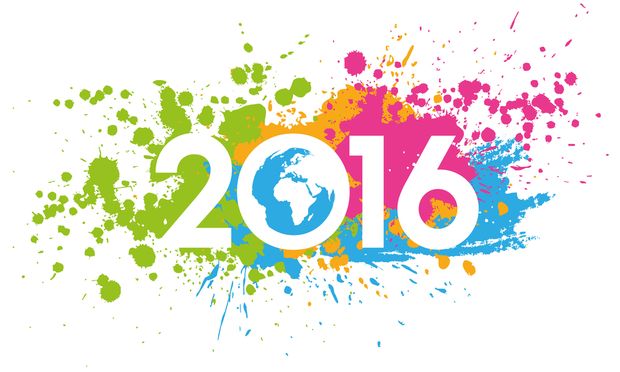2016’s top 6 albums: diverse new music from veteran artists
The year 2016 will be remembered more for its political discord than it will be for a diverse selection of new music. Through all of the static, the unnecessary noise of political punditry and the derision elicited from those in high office, newsrooms and living rooms, 2016 managed to produce a rich catalogue of new records from emerging and veteran artists alike.
Whittling the years’ best records (this is entirely subjective) down to the top six is a wrist-wringing process. Why six? It could be because it’s the year 2016. Or it could be because A Tribe Called Quest, A Day to Remember and Good Charlotte all returned with their sixth full-lengths. Who knows?
Without further meddling, here are my top records for 2016:
6. Modern Baseball – “Holy Ghost” – Run For Cover Records
Why it matters: The Philadelphia-based indie-pop-punk fusion quartet cut their third record, “Holy Ghost,” in their hometown, shedding everything but their skin on the studio floor. The first half of “Ghost” directly tackles the death of guitarist and co-lead vocalist Jake Ewald’s grandfather, while the second half features lyrical content surrounding guitarist and co-vocalist Brendan Luken’s battle with mental illness. The brevity of the record focuses its heavy topics into nimble little indie-rock charmers with gut-punching emo inflections. Intricate guitar leads curl in and out of Luken’s deprecatory self-reflections on the pounding “What If…” Likewise, the haunting closing track, “Just Another Face,” addresses the singer’s deepest insecurities, proclaiming, “I’m a waste of time and space,” over a droning guitar and Ian Farmer’s rolling bass line. “Holy Ghost” is firmly gripped in the cold realities of death, longing, brevity and mental disease, yet somehow Modern Baseball makes said topics listenable and even engaging with a semi-spoken word delivery that listens like poetry in an alternating refrain. “Holy Ghost” peaked at number 53 on the U.S. Billboard Top 200 Albums Chart.
5. Silent Planet – “Everything Was Sound” – Solid State
Why it matters: Raw. That one word encapsulates Los Angeles-bred Silent Planet’s socially-conscious brand of metalcore on their sophomore effort, “Everything Was Sound.” But, as with most good records, one word cannot fully describe an entire record. Lead vocalist Garrett Russell, who has an academic background in literature and psychology, balances the ferocity of his grating, rhythmic vocal patterns with the intellect of his lyrics. As a Christian, Russell frequently cites passages from the Bible like a term paper, providing the listener with an informed perspective to complement the record’s bruising arrangements. “Psychescape” rips in and out of razor-sharp guitars and brooding interludes, while Russell trades frantic vocals with scene legend Spencer Chamberlain (Underoath). The song’s disconnected vocals and shifting time signatures represent the mind of someone battling mental illnesses such as bipolar disorder and schizophrenia. “Panic Room” is a thunderous exploration of post-traumatic stress disorder, which Russell studied during graduate school in returning veterans. Although the warping moods of the record take time to digest, “Everything Was Sound” is a rewarding listen filled with themes of environmentalism and self-help, initiating the will to help others. “Everything Was Sound” made its way to number 85 on Billboard’s U.S. Top 200 Albums Chart.
4. Andy Black – “The Shadow Side” – Republic Records/Lava Records
Why it matters: Andy “Black” Biersack split his time in 2015 between fronting the Hollywood metal outfit, Black Veil Brides, and his alter ego, the darkwave-fueled synth pop identity “Andy Black.” His first LP as Mr. Black crosses musical boundaries, splicing mind-burrowing hooks with dark lyricism, and is bolstered by the songwriting prowess of John Feldmann (Goldfinger, Good Charlotte), Patrick Stump (Fall Out Boy), and Gerard and Mikey Way (My Chemical Romance), among other alternative scene fixtures. Opener “Homecoming King” pits vaudeville eccentricity with grandiose melodies, while “We Don’t Have to Dance,” cowritten by Fall Out Boy singer Patrick Stump, is a dance-punk ode to misanthropy. The record shifts genres from EDM-powered anthems (“Ribcage”) to dark pop-punk numbers (“Louder Than Your Love”), featuring My Chemical Romance members Gerard and Mikey Way as main contributors. Black’s commitment to this alternative world helps his debut solo record strike a balance between morose lyricism, pulsing synths and theatric melodies. Black’s “The Shadow Side” catapulted to number 22 on Billboard’s U.S. Top 200 Albums Chart and spawned Black’s first ever solo tour in the U.S.
3. Issues – “Headspace” – Rise Records
Why it matters: Most bands that are lucky enough to exist past four records see vast changes in musical direction, or lack thereof. Atlanta genre-mashers Issues is on record number two and have already reincarnated. Sort of. Co-frontman Michael Bohn’s hearty screamed vocals are still present, and so too is his newfound singing voice. His counterweight, Tyler Carter, trades a soulful tenor throughout “Headspace” with Bohn’s harsh screams and radio-friendly clean vocals. The musicianship heard on “Headspace” is as intricate as it is groovy (not in the cheesy way). Sky Acord’s jazz-infused bass lines smooth out the record’s calmest moments in concert with drummer Josh Manuel’s kinetic footwork. Cuts like “The Realest” massage Issues’ jazz and hip-hop urges, while “Yung and Dum” juxtaposes sun-kissed fiddle and mandolin interplay with sludgy guitars and features country artist Jon Langston on the bridge. Issues maintains its heaviest tendencies with slugging tracks like “Flojo” and “Blue Wall,” the latter being a scathing attack on systemic racism in law enforcement. Several members of Issues have been on record staging their protest to such violence, with three of the band’s essential members being African-American. Issues’ “Headspace” is another genre-bending record worth your listen, if not purchase. The record went number one on Billboard’s Alternative Albums Chart and number 20 on its U.S. Top 200 Albums Chart.
2. Panic! At the Disco – “Death of a Bachelor” – Fueled by Ramen
Why it matters: Few artists have resisted making the same record twice like Panic! At the Disco. Their fifth full-length, “Death of a Bachelor,” has obliterated the need for genre specificity with one of Kim Jong-un’s nuclear bombs. Panic! is essentially a one-man operation with Brendon Urie playing most of the instruments needed to make “Bachelor.” That said, this record is a blast of glamorous, drug-fueled debauchery (“Don’t Threaten Me With a Good Time”) and arousing declarations of royalty (“Emperor’s New Clothes”). Urie’s limitless vocals go gospel on the sinful pop smash, “Hallelujah,” and dial up the bombast on the horn-powered baroque-punk of “Crazy=Genius.” The most interesting inflection Urie charms with, however, is that of Frank Sinatra on the modernized jazz of the title track and raw closing track, “Impossible Year.” The record addresses Urie’s experience as a bachelor before his inevitable marriage. Underneath all of Urie’s tricks and showmanship, however, is a brilliant songwriter and heartfelt lyricist with lines like, “These nightmares always hang on past the dream,” on the aforementioned closer. Cementing his platform as a genre-defying showman from Las Vegas, Panic’s “Death of a Bachelor” grabbed a number one spot on the Billboard Top 200 Albums Chart with nearly 400,000 albums sold as of July, according to music data provider Nielsen.
1. A Tribe Called Quest – “We Got it from Here . . . Thank You 4 Your Service” – Epic Records
Why it matters: 2016’s biggest comeback dropped during the week that Donald Trump was declared the president-elect of the United States. A Tribe Called Quest’s “We Got it” is borne from pure racial, political and personal strife, featuring the last record the late rapper Phife Dawg will contribute to. Dawg passed away in March of this year, according to the New York Times, because of issues relating to his diabetes. The group’s first record since 1998 addresses the current political and social climate in the States with the delicate jazz chords on “We the People…” Meanwhile, the reggae-inflected “The Donald” crystallizes Dawg’s formal sendoff. Q-Tip ruthlessly skewers racial tension and gentrification, all while rewriting the Constitution as we know it, reflecting a more volatile rhetoric voiced during Trump’s campaign: “All you black folks, you must go. All you Mexicans, you must go. All you poor folks, you must go.” The vibrant jazz aesthetic underlays each rapper’s social commentary, which tackles a perpetuated race war and women’s rights issues (“Whateva Will Be”). The record features a who’s-who list of contributors; Elton John, Kanye West, Kendrick Lamar and Andre 3000 are just a few of the high-profile names who either made the trip to Tip’s New Jersey studio or contributed their parts externally. “We Got it…” finds A Tribe Called Quest reassembled for a powerful, lyrically-rich opus. It debuted at number one on Billboard’s Top 200 Albums Chart.











